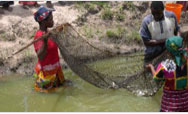Elections have been marred by conflict since Mozambicans first went to the polls ten years ago. One political party, FRELIMO, has held power for twenty-seven years.
Opposition parties boycotted the nation’s first municipal elections in 1998. A year later, the main opposition party RENAMO accused FRELIMO of stealing the presidential election after officials declared tally sheets containing some 300,000 votes illegible - more than the margin of victory - and refused to count them. Demonstrations followed, leading to the death of more than 100 protestors.
|
|
Not surprisingly, political tensions ran high as the second municipal elections approached in 2003. The November vote for mayor and city council in thirty-three cities and towns represented a critical test for democracy in Mozambique. Fearing that political tensions and disputed results could lead to violence, citizen groups including Christian and Islamic councils formed a partnership called the Electoral Observatory. With USAID funding, the Observatory trained and deployed more than 400 citizens as poll-watchers. Unlike most election observers, their role was to conduct a separate vote count to compare to the official results in ten key municipalities.
USAID provided key assistance, training, and logistics services including equipment and transportation in an effort to ensure a peaceful and impartial municipal election. In the town of Marromeu, population 21,000, the project revealed probable election fraud in the mayor’s race. Preliminary official results gave FRELIMO a two-vote victory, but the parallel count showed otherwise. In the end, the National Elections Commission accepted the Observatory’s numbers and declared the opposition candidate the winner.
The Observatory also played a vital role in Beira, Mozambique’s second-largest city, where a crisis erupted when an election official was caught altering vote tally sheets. Other tally sheets were reported missing. For three days, election officials were silent. Meanwhile, a growing crowd of opposition supporters awaiting the results became increasingly agitated. The Observatory poll-watcher was credited with keeping the peace by serving as a mediator and objective information source until the problems were resolved.
The 2003 municipal elections marked a new stage for democracy in Mozambique. Today, the two main political parties - adversaries in war not that long ago - peacefully share power at the municipal level for the first time in history. And the Observatory is planning a bigger project - a parallel vote count for the upcoming presidential election.
|


